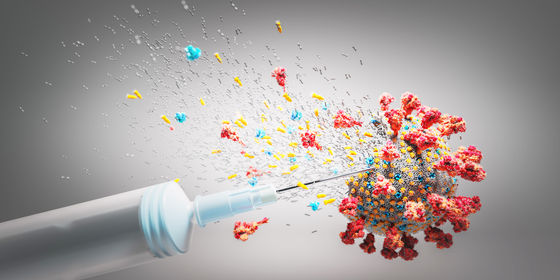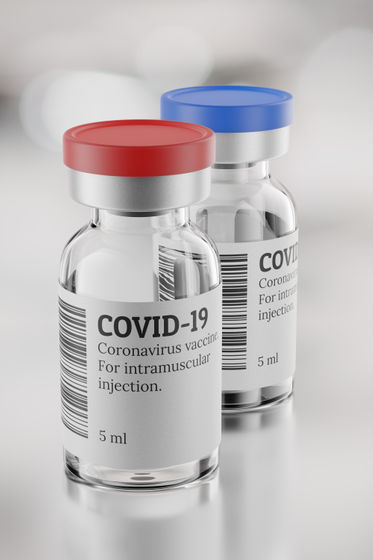Experts answer four questions, such as 'How is Johnson & Johnson's new corona vaccine different from other vaccines?'

How does the Johnson & Johnson vaccine compare to other coronavirus vaccines? 4 questions answered
https://theconversation.com/how-does-the-johnson-and-johnson-vaccine-compare-to-other-coronavirus-vaccines-4-questions-answered-155944
◆ 1: How does the Johnson & Johnson vaccine work?
Both vaccines such as 'BNT162b2' developed by Pfizer and German biotechnology company BioNTech and Moderna's 'mRNA-1273' use messenger RNA (mRNA) that the virus uses to synthesize proteins based on genetic information. This is the ' RNA vaccine ' used. When the mRNA of the spike protein on the surface of SARS-CoV-2 is administered to the human body, the spike protein is synthesized in the body, and the human body reacts to it to acquire immunity, which is the basic principle of RNA vaccine. How it works. Special particles called lipid nanoparticles are used to administer mRNA.

On the other hand, the Johnson-End-Johnson vaccine allows a
When a part of the genetic information of adenovirus is rewritten to that of SARS-CoV-2 and then injected into the body, the genetic information in the virus enters the cells. Then, the spike protein is synthesized in the human body, and the immune system that recognizes this as a foreign substance makes an antibody to obtain immunity to SARS-CoV-2.
According to Associate Professor Ferran, the adenovirus in the vaccine is detoxified, so there is no risk of it multiplying in the human body or causing illness. In addition, since only the protein on the surface of SARS-CoV-2 is synthesized in the body, there is no need to worry about developing a new type of coronavirus infection (COVID-19).
The RNA vaccine was first developed as a vaccine for the new coronavirus infection (COVID-19), but the viral vector vaccine has been in use for some time.The vaccine for Ebola produced by Johnson & Johnson is the same viral vector vaccine developed this time.
◆ 2: Is it effective?
As a result of clinical trials conducted in the United States, the Johnson & Johnson vaccine is 72% effective against COVID-19 infection, and 86% effective especially in preventing aggravation. I found out. On the other hand, the efficacy in a study conducted in South Africa was 64%, but it was 82% effective in preventing aggravation.

This suggests that Associate Professor Ferran 'although the chances of a vaccinated person having COVID-19 remain, the chances of being hospitalized or dying from COVID-19 are significantly lower.' It states. In addition, according to the FDA report, the Johnson & Johnson vaccine has been shown to be effective against mutant strains found in the United Kingdom and elsewhere.
◆ 3: How is it different from other vaccines?
Pfizer and Moderna vaccines need to be given twice at intervals of 3-4 weeks, but due to the stagnation of vaccination plans and delays in securing vaccines, 'the first decision is to have many people inoculate the first dose. and not one 'in the discussion also have been made. In addition, although the result that the moderna vaccine is 'effective even if the amount of vaccine per dose is reduced to half', it is necessary to inoculate twice.
Moderna's new corona vaccine may provide sufficient immunity at 'half dose'-GIGAZINE

On the other hand, Johnson & Johnson's vaccine is effective once, so Associate Professor Ferran said, 'It is an important point in the shortage of vaccines.'
It has also been pointed out that Pfizer's vaccine needs to be stored at an ultra-low temperature of minus 70 degrees Celsius, which makes it a ' nightmare for logistics', but Johnson & Johnson's vaccine is normal for two years at minus 20 degrees Celsius. It can be stored for 3 months even at 2 to 8 degrees, which can be achieved in the refrigerator, so there is an advantage in that inoculation is easy.
◆ 4: Which vaccine should I choose after all?
The Johnson & Johnson vaccine has been shown to be 72% effective in US clinical trials, while the Pfizer and Moderna vaccines are both nearly 95% effective. However, Associate Professor Ferran pointed out, 'Because the test methods are different in the first place, it is not possible to simply compare the effectiveness of vaccines.'
On top of that, Associate Professor Ferran said, 'You should not wait until you can choose a vaccine. As many people as possible need to be vaccinated to control the development of mutant strains,' he said, regardless of the manufacturer's vaccine. , He said that if you can get the vaccination, you should get it immediately.
Related Posts:
in Note, Posted by log1l_ks







